The 30-page article, The prism of the public sphere: The COP15 coverage by the Brazilian media system (2017), was written by Diógenes Lycarião and Antal Wozniak, and published in the Journal of Public Deliberation: Vol. 13: Iss. 1. In the article, the authors provide an analysis of the contributions media provides for the public to understand and engage with deliberative and governmental processes, as exemplified in the Brazilian coverage of the 15th UN’s Climate Change Conference (COP15). Read an excerpt of the article below and find the PDF available for download on the Journal of Public Deliberation site here.
From the introduction…
In studies of political communication, news media are often regarded as a locus for what Page (1996) calls “mediated deliberation” (for an up-to-date overview, see Rinke, 2016), i.e. the sphere in which “communication professionals convey information, values, and diverse points of view to the mass public, which then deliberates vicariously through the give-and-take and to-and-fro of these various professionals” (Gastil, 2008, p. 50). Based on this paradigm, increasingly sophisticated methods and analyses have been developed to assess the “deliberativeness” of media content (cf. Wessler & Rinke, 2014; van der Wurff, Verhoeven, & Gadellaa, 2013).
This strand of literature offers valuable contributions to comprehending in a more nuanced way the different conditions under which the quality of deliberation in the media system might improve or decrease. But in our understanding of the news media’s role in the division of labor in modern societies’ “deliberative systems” (cf. Mansbridge, 1999; Parkinson & Mansbridge, 2012) a number of questions remain unanswered, especially when it comes to problems posed by increasing social complexity (cf. Bohman, 2007). This is because while most studies concerned with mediated deliberation have been focusing on deliberativeness of media content, its mediation dimension (or systemic function) has received less scholarly attention.
This seems to be problematic since mediation between different discursive arenas and perspectives is crucial for making the concept of a deliberative system — and its core principle of deliberative division of labor — empirically plausible. This becomes clear when one takes into account one of the main obstructions that increasing social complexity brings to the normative idea of public deliberation. Such an increasing complexity poses a formidable challenge to holding specialized discourses and institutions accountable to the public sphere (cf. Bohman, 2000, 2007; Christiano, 2012; Fischer, 2009) which is one of the crucial normative ideals of public deliberation.
This paper aims to contribute to closing this research gap by conducting an empirical case study in which we operationalize a systemic view of mediated deliberation. Our emphasis is on the mass media’s functional dimension of mediation in the deliberative division of labor within a deliberative system. We investigate how distinct contributions to the deliberative systems – namely the provision of publicity and intelligibility – are articulated via outputs from different media types. In doing so, this study aims to shed light on how the media system contributes to an articulation and exchange of ideas between civil society and administrative powers in contexts of highly complex governance processes.
In order to explore this articulation, we propose the idea of mediation as an epistemic operator (i.e., a truth-tracker between different discursive arenas) of the deliberative system. By using this operator in terms of its communicative power, it becomes possible to interpret modern democracies and their decision-making processes in a way that identifies a consistent and systematic bridging of the increasing gap between the administrative power and the public sphere.
The main theoretical purpose of this work is to explore how journalistic practices might build this kind of bridge, specifically in situations characterized by high regulatory complexity, such as those triggered by international or transnational governance regimes. These regimes are paradigmatic in this regard since political debate and negotiations in these situations adopt a language far removed from the language of everyday life. Thus, they are disconnected from the lifeworlds of most citizens. In this context, we argue that the media system is able – to some extent – to facilitate the communicative exchange between international governance regimes and a national citizenry. This bridge consists of a preliminary mediation that journalistic practices produce of the social complexity involved in these decision-making processes.
In order to assess this preliminary mediation and, therefore, a relevant dimension of the mass media’s role in the deliberative system, we conducted a case study about the Brazilian coverage of the 15th United Nations Climate Change Conference (COP15), which took place in December 2009 in Copenhagen, Denmark. For this, all fact-based articles (n=86) about the COP15 published or broadcast in two central media outlets of the Brazilian media system were selected. One is the nightly TV newscast Jornal Nacional (JN) and the other the quality daily newspaper Folha de São Paulo (FSP). We selected these two central instances of the Brazilian media system in order to test the reasoning that each one of these media outlets would fulfill normative criteria (or principles) of a deliberative system to varying degrees. Despite both being central elements of the Brazilian media system, they are also rather distinct in terms of modality, presentation style, and target audience, to name but a few.
We selected these different media types because of their distinct features, assuming they would fulfill different deliberative functions. So it’s not a case of trying to find differences in similar cases, but to uncover how different modalities, presentation styles, target audiences, etc. lead to distinct contributions within a deliberative system. With the purpose of controlling the difference regarding the relevance of opinion-oriented articles (which is much more pronounced in quality newspapers), we analyzed only fact-based articles and developed a multimodal content analysis suitable both for newspaper articles and for TV newscasts.
In the following chapter, we explicate the idea of mediation as an epistemic operator of the deliberative system. We then present our case study and explain the reasons why the COP15 and the selected media outlets are adequate for assessing the mass media’s role in the deliberative system in view of the problem posed by increasing social and regulatory complexity. The third section explains the operationalization of the normative principles of publicity and intelligibility for a content analysis of the selected news material. After presenting and discussing our research results, we indicate how conceiving the media system both as a prism of the public sphere and as a gateway to the informative system improves our understanding of the mass media’s role in the deliberative system. We also reflect about the systemic adequacy of our empirical observation by highlighting media systems’ role in actually involving citizens with different levels of political knowledge in an active engagement of comprehension and interpretation of complex governance processes. In order to improve this engagement, we also devote a section to point out implications for media professionals and public officials. Finally, we outline how future research may improve our understanding about how journalistic mediation works differently depending on the media outlet and the distinct normative principles of deliberative democracy in question.
Download the full article from the Journal of Public Deliberation here.
About the Journal of Public Deliberation
Spearheaded by the Deliberative Democracy Consortium in collaboration with the International Association of Public Participation, the principal objective of Journal of Public Deliberation (JPD) is to synthesize the research, opinion, projects, experiments and experiences of academics and practitioners in the emerging multi-disciplinary field and political movement called by some “deliberative democracy.” By doing this, we hope to help improve future research endeavors in this field and aid in the transformation of modern representative democracy into a more citizen friendly form.
Follow the Deliberative Democracy Consortium on Twitter: @delibdem
Follow the International Association of Public Participation [US] on Twitter: @IAP2USA
Resource Link: www.publicdeliberation.net/jpd/vol13/iss1/art8/
 Areas of interest and application for the course will include:
Areas of interest and application for the course will include: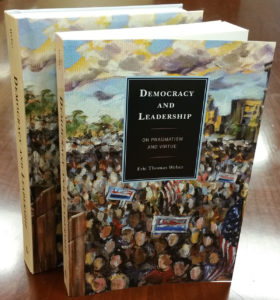 Democracy and Leadership: On Pragmatism and Virtue (Lanham, MD: Lexington Books, 2013)
Democracy and Leadership: On Pragmatism and Virtue (Lanham, MD: Lexington Books, 2013)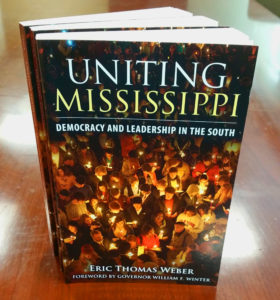 Uniting Mississippi: Democracy and Leadership in the South (Jackson, MS: The University Press of Mississippi, 2015)
Uniting Mississippi: Democracy and Leadership in the South (Jackson, MS: The University Press of Mississippi, 2015) In addition, for those who are unfamiliar, I co-host the Philosophy Bakes Bread radio show & podcast that airs on WRFL Lexington, 88.1 FM and in the show we cover a number of public policy topics. Give it a listen!
In addition, for those who are unfamiliar, I co-host the Philosophy Bakes Bread radio show & podcast that airs on WRFL Lexington, 88.1 FM and in the show we cover a number of public policy topics. Give it a listen!
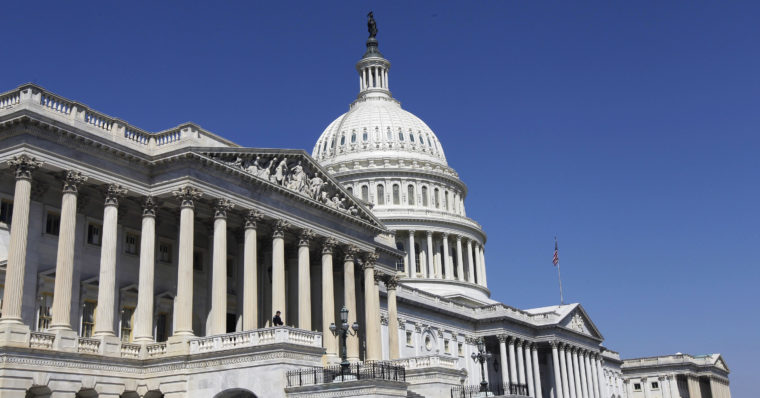
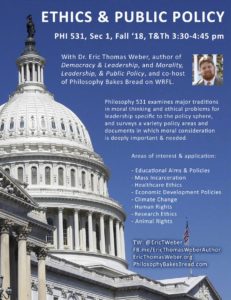
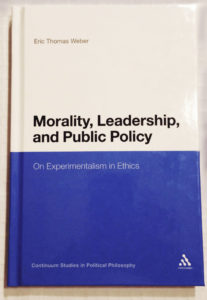
 One result is a six-minute video that we are releasing today. The video is based on a series of interviews with participants in a June workshop called “Operationalising Green Governance.” Held at a lovely retreat center north of Paris, a handful of participants – international law professors, human rights advocates, activists – were interviewed on camera by Ibby Stockdale, Director of a British film production company, Five Foot Four. Ibby brilliantly distilled hours of interview footage and crafted a succinct, beautifully produced message.
One result is a six-minute video that we are releasing today. The video is based on a series of interviews with participants in a June workshop called “Operationalising Green Governance.” Held at a lovely retreat center north of Paris, a handful of participants – international law professors, human rights advocates, activists – were interviewed on camera by Ibby Stockdale, Director of a British film production company, Five Foot Four. Ibby brilliantly distilled hours of interview footage and crafted a succinct, beautifully produced message. 


 The easy-to-use, 40-page guide frames the possibilities that discussion participants can consider in two categories. The first, “Setting the Stage,” focuses on immediately impact awareness and action, and the second, “Meeting the Continuing Climate Challenge,” is focused on the more complicated, long-term approaches needed to impact infrastructure and natural systems.
The easy-to-use, 40-page guide frames the possibilities that discussion participants can consider in two categories. The first, “Setting the Stage,” focuses on immediately impact awareness and action, and the second, “Meeting the Continuing Climate Challenge,” is focused on the more complicated, long-term approaches needed to impact infrastructure and natural systems.